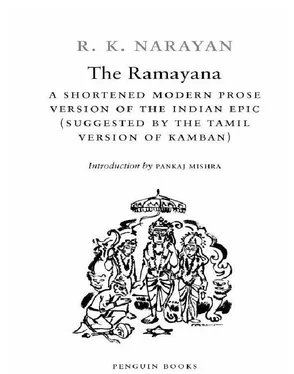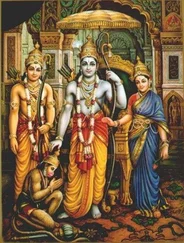Махариши Вальмики - The Ramayana
Здесь есть возможность читать онлайн «Махариши Вальмики - The Ramayana» весь текст электронной книги совершенно бесплатно (целиком полную версию без сокращений). В некоторых случаях можно слушать аудио, скачать через торрент в формате fb2 и присутствует краткое содержание. Жанр: Старинная литература, на английском языке. Описание произведения, (предисловие) а так же отзывы посетителей доступны на портале библиотеки ЛибКат.
- Название:The Ramayana
- Автор:
- Жанр:
- Год:неизвестен
- ISBN:нет данных
- Рейтинг книги:3 / 5. Голосов: 1
-
Избранное:Добавить в избранное
- Отзывы:
-
Ваша оценка:
- 60
- 1
- 2
- 3
- 4
- 5
The Ramayana: краткое содержание, описание и аннотация
Предлагаем к чтению аннотацию, описание, краткое содержание или предисловие (зависит от того, что написал сам автор книги «The Ramayana»). Если вы не нашли необходимую информацию о книге — напишите в комментариях, мы постараемся отыскать её.
The Ramayana — читать онлайн бесплатно полную книгу (весь текст) целиком
Ниже представлен текст книги, разбитый по страницам. Система сохранения места последней прочитанной страницы, позволяет с удобством читать онлайн бесплатно книгу «The Ramayana», без необходимости каждый раз заново искать на чём Вы остановились. Поставьте закладку, и сможете в любой момент перейти на страницу, на которой закончили чтение.
Интервал:
Закладка:
The visitor said, “I have come from afar after hearing of your greatness. My ambition in life has been to have a glimpse of one who is renowned alike for his valour and generosity. Now, after meeting you, I have attained my life’s ambition. Achievements such as yours cannot be measured. When a poor man like me has a glimpse of your divinity, a part of it comes to me also.”
“Oh great one, do not praise me,” Mahabali replied. “I am after all a fighter and conqueror—base qualities when compared to the learning and special attainments of one like you. I am not easily led by appearances. I can know how great you must be. I shall be happy if you will accept a gift in return for the honour you have done in visiting me.”
“I want nothing. I need no gift other than your goodwill.”
“No, please don’t go, ask for something, mention anything you want. It will please me to grant it.”
“If you insist, then give me a piece of land.”
“Yes, choose it wherever you like.”
“Not more than what would be measured in three strides of my feet . . .”
Bali laughed, looked him up and down, and said, “Is that all?”
“Yes.”
“I shall now . . . ,” began Mahabali, but before he could complete his sentence, his guru Sukracharya interrupted to warn, “King, do not be rash. The small figure you see is a deception: he is minute, but this microcosm . . .”
“Oh, stop! I know my responsibility. To give while one can is the right time, and to prevent a gift is an unholy act, unworthy of you. He who is selfish is never worse than the one who stays the hand that is about to give. Don’t stop me,” he said; and poured out a little water from a vessel on the upturned palm of the little man to seal his promise. (It is found in some texts that at this moment Sukracharya assumed the size of a bee and flew into the spout of the vessel in order to block the flow of water and thus prevent the oath being given. The dwarf, sensing this, took a sharp dharba grass and thrust it in to clear the obstruction and it pricked the eye of Sukracharya, who thereafter came to be known as the one-eyed savant.) Pouring this oblation of water, Bali said to the little man, “Now measure and take your three steps of earth.”
The moment the water fell on his hand, this person, who was a figure of fun even to his parents till then, assumed a majestic stature spanning the earth and the sky. With the first step he measured the entire earth, with the second he covered the heavens. No more space was left in the whole universe, and he asked Mahabali, “Where shall I place the third step?”
Mahabali, overawed, knelt, bowed, and said, “Here on my head, if no other space is available.” Vishnu raised his foot, placed it on Mahabali’s head, and pressed him down to the netherworld. “You may stay there,” he said, and thus disposed of the tormentor of the worlds.
Concluding the story, Viswamithra announced, “This is the end of our journey for the time being. Here I will perform the sacrifices under your protection.”
In due course Viswamithra gathered a good company of saints and made preparations for the yagna, Rama and Lakshmana guarding the ground. Meanwhile the asuras assembled in the skies above the holy ground, ready to disrupt the yagna. The demons were armed with a variety of deadly weapons; they shrieked and howled and attempted in other ways to create confusion. They flung boiling water and offal on the holy ground; uttered menaces, curses, and blasphemies; tore out huge rocks and flung them down; and set in force terrifying magical disturbances.
The saints looked distraught. Rama advised the sages, “Do not feel disturbed. Proceed with your prayers.”
Lakshmana said to Rama, “I will deal with them.” He shot at them, while Rama sent up his arrows and created an umbrella to shield the sacrificial fire from being defiled by the asuras’ blood. Subahu and Mareecha, the sons of Thataka thought this their best chance to avenge the death of their mother and aimed their attack at Rama, whose first shot carried Mareecha far out and threw him into the sea; the second one eliminated Subahu. The demons who had gathered with such zest withdrew in panic.
The sacrifice was successfully accomplished. Viswamithra declared, “Rama, you alone could help me in this task. This was performed not for my personal satisfaction, but for the good of humanity itself.”
Rama asked, “What next?”
Viswamithra said, “You have accomplished much now. There is a great deal yet ahead of you,” hinting at the tasks that Rama would have to fulfill in this incarnation. “For the present let us proceed towards Mithila City, where a great yagna is to be performed by King Janaka, and where many others will be arriving; you may enjoy this diversion.” Although he suggested this step as a sort of relaxation for Rama, he knew by foresight that it was but the beginning of a great series of events in which Rama’s future would be involved.
At the end of a day’s journeying, they arrived at a valley where the Ganges was flowing. “There you see,” said Viswamithra, “the river Ganga, the holiest river in the world, starting from the Himalayas, running her course through mountains and valleys and across several kingdoms. Today she flows along peacefully, but at the beginning . . . Now listen to her story.”
GANGA’S STORY
Every inch of ground on earth, as you may have realized by now, has a divine association. Mother Earth has been there since the beginning of creation, being one of the five primeval elements. She has seen countless pairs of feet running about on thousands of aims and pursuits, both evil and good, and will continue until Time (“Kala”) swallows and digests everything. Even after the participants have vanished, every inch of earth still retains the impress of all that has gone before. We attain a full understanding only when we are aware of the divine and other associations of every piece of ground we tread on. Otherwise it would be like the passage of a blind man through illuminated halls and gardens. That is the reason why I have explained to you the story of every place we have passed through. You see that river now. It is Ganga flowing along the valley, coming down from the Himalayas, carrying within her the essence of rare herbs and elements found on her way. She courses through many a kingdom, and every inch of the ground she touches becomes holy; Ganga cleanses and transforms; the dying person with a sip of that water or with the ashes of his bones dissolved therein attains salvation. Now you find the river serene and beautiful. But Ganga had to be tamed and controlled before she could touch this earth; her story involves the fate of your ancestors, very early ones.
Sakara, one of your ancestors, ruled the earth with great distinction at one time. He had numerous sons, all valorous and devoted to their father. At the proper time in his career, he planned to perform a very important sacrifice—the “Horse Sacrifice.”
In preparation for this ceremony a resplendent horse fully caparisoned and decorated is set free and trots along at will through the frontiers of many kingdoms, and every country that lets the horse pass through is considered to have accepted the suzerainty of the horse’s owner. But if at any point anyone attempts to hold up the horse, it is taken as a challenge and causes a war; the original owner of the horse attacks the country where the horse is held and sets it free again, and again and again until it gets through and returns home. Then all the countries through which it has passed become vassals of the king, and the king celebrates his victory with the great “Horse Sacrifice” which makes him supreme lord of the earth. Those who embark on such a plan are confident of victory and could eventually aspire to extend their empire and challenge Indra himself. Hence Indra and all the gods are very watchful and nervous whenever a sacrifice is planned, and do their best to defeat it.
Читать дальшеИнтервал:
Закладка:
Похожие книги на «The Ramayana»
Представляем Вашему вниманию похожие книги на «The Ramayana» списком для выбора. Мы отобрали схожую по названию и смыслу литературу в надежде предоставить читателям больше вариантов отыскать новые, интересные, ещё непрочитанные произведения.
Обсуждение, отзывы о книге «The Ramayana» и просто собственные мнения читателей. Оставьте ваши комментарии, напишите, что Вы думаете о произведении, его смысле или главных героях. Укажите что конкретно понравилось, а что нет, и почему Вы так считаете.












